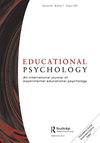第三文化儿童:多元文化和游牧在身份、福祉和教育方面的后果
IF 3
2区 心理学
Q1 EDUCATION & EDUCATIONAL RESEARCH
引用次数: 0
摘要
在全球化的世界中,日益增加的移徙趋势导致广泛的社会后果。越来越多的年轻人可以被定义为第三文化儿童(TCK),即在发展早期接触不同文化范式的个体。作为一个TCK显著影响身份,福祉和整体功能的发展。tck在教育领域的经验也有实质性的影响。然而,在波兰的研究中,新形式的多元文化身份问题并没有得到充分的体现。以下综述旨在填补这一空白,并介绍TCK现象研究的最新趋势。本文批判性地评价了关于第三文化儿童的现有研究。它进一步介绍了TCK多元文化经验的后果,强调多元文化主义和全球游牧主义在福利、身份和教育领域的重大问题和利益。重要的是,处理多元文化认同的方式,即所谓的多元文化认同配置,被认为是多元文化主义对TCK功能影响的调节者。研究指出了支持tck幸福感和教育成功的因素,包括心理属性(多元文化认同融合、文化智力、全球思维)和制度属性(教学系统、心理支持)。本文章由计算机程序翻译,如有差异,请以英文原文为准。
Third Culture Kids: The consequences of multiculturalism and nomadism in the context of identity, well-being and education
In a globalizing world, increasing migration tendencies lead to broad social consequences. More and more young people can be defined as Third Culture Kids (TCK), individuals exposed to diverse cultural paradigms in the early developmental years. Being a TCK significantly affects the development of identity, well-being and overall functioning. There are also substantial consequences of TCKs experiences in the field of education. Yet, the problem of new forms of multicultural identities is not sufficiently represented within Polish research. The following review aims to fill this gap and present the latest trends in studies on the TCK phenomenon. This article critically evaluated existing research regarding Third Culture Kids. It further presented the consequences of the multicultural experience of TCK, emphasizing significant problems and benefits of multiculturalism and global nomadism in the areas of well-being, identity and education. Importantly, ways of dealing with multicultural identity, the so-called multicultural identity configurations, were presented as moderators of the influence of multiculturalism on the functioning of TCK. Factors supporting TCKs well-being and educational success were indicated, including psychological (multicultural identity integration, cultural intelligence, global mindset) and institutional (teaching systems, psychological support) attributes.
求助全文
通过发布文献求助,成功后即可免费获取论文全文。
去求助
来源期刊

Educational Psychology
Multiple-
CiteScore
6.40
自引率
6.20%
发文量
57
期刊介绍:
This journal provides an international forum for the discussion and rapid dissemination of research findings in psychology relevant to education. The journal places particular emphasis on the publishing of papers reporting applied research based on experimental and behavioural studies. Reviews of relevant areas of literature also appear from time to time. The aim of the journal is to be a primary source for articles dealing with the psychological aspects of education ranging from pre-school to tertiary provision and the education of children with special needs. The prompt publication of high-quality articles is the journal"s first priority. All contributions are submitted "blind" to at least two independent referees before acceptance for publication.
 求助内容:
求助内容: 应助结果提醒方式:
应助结果提醒方式:


